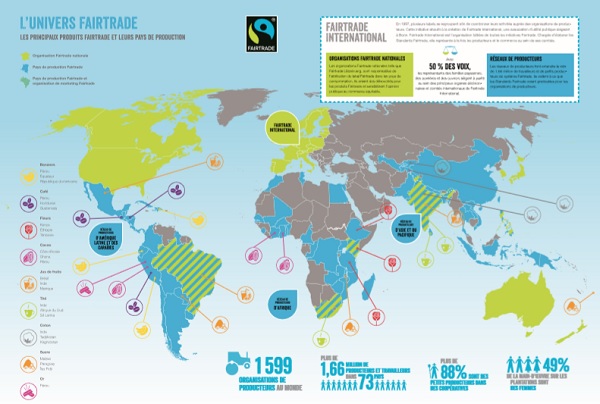
In 2018, a ttoal of 115 events were organized by Fairtrade Lëtzebuerg and its partners, representing an annual participation of approximately 9,000 people. In addition, citizenship education work was conducted with a young audience; out of 86 events, including 34 workshops in primary schools and 52 workshops in secondary schools. The Fairtrade Lëtzebuerg NGO also held a workshop for adults entitled "From the cotton producer to your wardrobe". Lastly, it also conducted political advocacy work on public procurement and the duty of vigilance for companies in the area of human rights.
Fair trade roses are the flagship product of fair trade in Luxembourg with a market share of 38%. Bananas, with a 30% market share, and coffee with 10%, complete the podium. 2018 was a year of innovation for Luxembourg Fairtrade products, notably with the widening of the range of pastries, the first certified fashion collection and the introduction of the first certified teas. In Luxembourg, 2,330 Fairtrade labelled products are available on the market, of which 186 come from Luxembourgish players. This means a good 24% increase in the "Luxembourg" Fairtrade offer compared to 2017.
The €20 million milestone, that seemed utopian just a few years ago to Luxembourg consumers, is hoped to be reached in 2020. The Fairtrade Lëtzebuerg NGO contributes to improving the living conditions of more than 1.66 million Fairtrade network producers and workers in 1,599 organisations in 73 countries. In fact, for both smallholder and plantation workers, the Fairtrade Guaranteed Minimum Price, a safety net against market price fluctuations, provides stability for planning and covering production costs. In addition, the more Fairtrade products are sold in our country, the more Fairtrade development bonuses are paid to producers' organisations - amounts paid in addition to the purchase price, which are allocated to projects that are important to the community. These contribute to improving people's quality of life and opening up better prospects for them, for example through the construction of wells, schools and clinics, and also by promoting women's rights, improvement of environmental protection measures, adaptation to climate change and sustainable agriculture.








